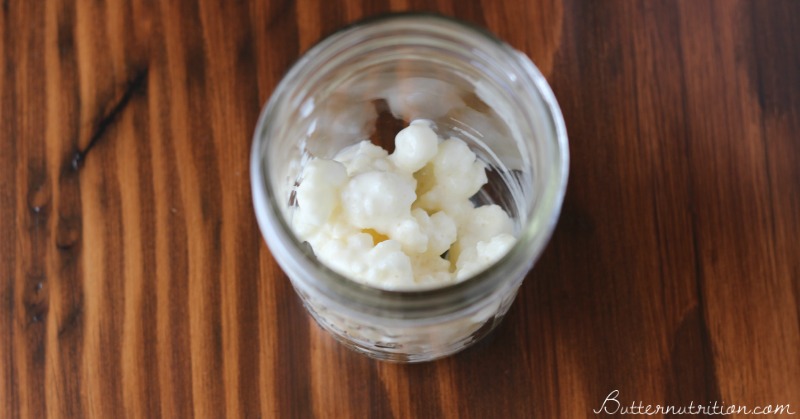There are a few foods that I just can't live without. These special foods have medicinal qualities and they can be extremely handy in your real food arsenal. #1, #2 and #8 are especially helpful when you are sick or if you have to take antibiotics! Maybe you can find a few to incorporate into your own routine?
1) A2 Dairy Products (preferably organic)
A2 dairy products are those that come from goats, sheep, humans, about 65% of Jersey cows, and a few other varieties. Milk that is considered to be A2 dairy is NOT the traditional cow milk that you'll find at your local grocery store. Traditional cow milk is what you call A1 dairy, commonly from a breed of cows called Holsteins, the most common dairy-cow breed you'll find in the US.
According to Keith Woodford, a professor who wrote Devil in the Milk: Illness, Health, and the Politics of A1 and A2 Milk, "We've got a huge amount of observational evidence that a lot of people can digest the A2 but not the A1," and that "More than 100 studies suggest links between the A1 protein and a whole range of health conditions." Although the evidence is far from conclusive, Woodford's found A1 protein is linked to everything from heart disease to autism and diabetes.
Because of the way A1 milk is broken down, it's more likely to be a problem for those with poor health or gut issues, where as making the switch to A2 milk may not be necessary for healthy individuals. According to Dr. Thomas Cowan, "One saving grace, as expressed in Devil in the Milk, is that the absorption of BCM 7 is much lower in people with a healthy GI tract. This also parallels the ideas of the GAPS theory which expounds upon this topic. BCM 7 is also not found in goat's or sheep's milk, so these types of milk might be better tolerated by those with a compromised digestive system." For anyone suffering from lactose intolerance or inflammatory diseases (autoimmunity, Rheumatoid arthritis, etc.) as well as autism, and diabetes, a trial swap is a very worthwhile idea.
Another natural perk of buying A2 milk is that you tend to get dairy products from small farm operations, and avoid the downside of mass-produced commercial milk. In Seattle, my hometown, it's very easy to find A2 milk. Goat and sheep milk dairy products are widely available, as well as cow milk from exclusively A2 Jersey cows.
Dairy can be overdone too contributing to health issues. Think more along the lines of 1-3 times per week versus 1-3 times per day.
If dairy products don't work for you, it may be suggestive of a food sensitivity or vitamin A toxicity.
2) Kefir and Kefir Grains
Kefir is like yogurt on steroids, and it comes from the turkish word keyif meaning: feeling good after ingesting it. While kefir falls into the yogurt category of dairy products, it has a thinner consistency than yogurt. The nutritional and probiotic content of kefir blows yogurt out of the water. A cup of kefir is loaded with B vitamins, calcium, K2, potassium, Phosphorus and about 6 grams of protein. According to a 2013 study, "Several studies have shown that kefir and its constituents have antimicrobial, antitumor, anticarcinogenic and immunomodulatory activity and also improve lactose digestion, among others."
The crazy thing about Kefir is it is extremely easy to make at home with kefir grains and milk of your choice. Kefir "grains" look like little milky pieces of cauliflower that you combine with milk in a glass jar, and then you let them sit on your counter at room temperature for about 18-24 hours to create the therapeutic probiotic drink. You can not only use these kefir grains again and again after straining them out of your finished product, but they also slowly multiply every time you use them; so you can share them with your friends too. If you want to store them for future use, just put them in the fridge for safe keeping with some fresh milk (as the microorganisms in kefir grains grow slower and can go dormant at cooler temperatures).
Commercially produced kefir that you find at your local grocery store probably won't have all the bacteria strains that are unique to kefir prepared at home with grains, so it is best to make it yourself. You can find kefir grains by asking people in your own community or by purchasing them here.
P.S. Fermented foods aren't for everyone at all times. If you have certain digestive issues such as severe bloating, fermented foods are sometimes best avoided until they can be introduced without causing trouble. Give yourself permission to listen to your body!
3) Non-GMO Pastured Eggs
You probably have eggs in your fridge, but are they pastured and non-GMO? When it comes to the nutrition in eggs, it makes a difference whether they are conventional or pastured:
"Compared to eggs of the caged hens, pastured hens' eggs had twice as much vitamin E and long-chain omega-3 fats, 2.5-fold more total omega-3 fatty acids, and less than half the ratio of omega-6:omega-3 fatty acids (P<0.0001). Vitamin A concentration was 38% higher (P<0.05) in the pastured hens' eggs than in the caged hens' eggs, but total vitamin A per egg did not differ." (source)
Eggs are like nature's multivitamins containing everything that is needed to create life. A single egg provides 6 grams of protein, vitamin A, vitamin D, vitamin E, B2, B5, B12, choline, and cholesterol. A good place to start is to try to get a few eggs (1-3) in your diet every week.
4) Organic Miso
While soy is not a health food, fermented soy products like miso, natto, and Tarmari are another story. Miso is a fermented soybean paste that is naturally rich in probiotics. If used in moderation, it can provide another easy way to get more nutrients and fermented foods into your daily diet.
5) Organic Beets (or beet juice)
Beets are amazingly therapeutic to your digestion and liver, and they are even a beauty food! Sluggish/stagnant bile flow is a common problem and beets have the ability to help thin your bile, which allows the body to detox more efficiently. After toxins are neutralized in the liver, they are dumped into the bile (bile duct is a river for toxins to move out of the body) and when the bile gets too thick, toxic matter can't flow out of the body quick enough (leading to fatigue, low energy, constipation, PMS, toxicity and disease)! Regular beet consumption (in addition to a wealthy diet) can help strengthen this process naturally. It doesn't matter too much how you want to eat them; raw beet slaw, roasted, or even in juice form, just find a way to get them into your diet. Personally, I love taking a "shot" of this stuff in a pinch when I don't have fresh beets around.
Try this at home: buy beets and shred them in your food processor. Have a little beet slaw (with lemon or apple cider vinegar, salt and olive oil) daily or as often as you like to help fuel your natural detoxification system. You can also juice beets with celery, cucumber and apples to enjoy a little fresh juice every day (I use this juicer to make the process quick and easy).
6) Organic Sauerkraut
Did you know that 1 tablespoon of raw unpasteurized sauerkraut (like this) can contain more probiotic bacteria than a whole bottle of probiotic supplements? Sauerkraut is another natural probiotic rich food because the fermentation process is great for your gut flora. Try getting 1-4 tablespoons of naturally fermented sauerkraut a few times per week.
7) Organic Coconut milk
Coconut milk should be a staple in any kitchen, and I often keep mine in the fridge or freezer after opening. Coconut milk is anti-inflammatory, anti-fungal, stimulating to the metabolism, easy to digest, and full of antioxidants. It's also a great milk substitute if you are dairy intolerant for one reason or another. I love using it for all sorts of things, but particularly for making ice cream, rice pudding and smoothies.
One quick tip: take a can of full fat coconut milk (like this) and mix it up in your blender till smooth, adding a little bit of vanilla extract if like. Next, poor it into ice-cube trays to freeze, and collect the cubes in a container you store in your freezer. Now you have perfectly portioned amounts of coconut milk, so you can just pop 1-2 in your blender every time you make a smoothie.
You can find my own homemade coconut milk recipe here.
8) Bone Broth
Bone broth is like hippy chicken stock. The only difference is that you add 2-4 tablespoons of vinegar to your pot of water, animal bones and the veggies you desire, before allowing it to simmer for 12-36 hours to produce rich, gelatinous broth. The vinegar pulls nutrients out of the tissues, particularly glycine, calcium, phosphorus, magnesium, potassium, sodium, and sulfur.
Bone broth is nutrient dense, extremely easy to digest, and helps you to "eat the whole animal," a paradigm that ensures you get balanced nutrition from all parts of an animal; not just the muscle meats that are popular in the Standard American Diet and inflammation supporting if eaten in excess.
9) Organic Root Vegetables
Root vegetables, such potatoes, onions, parsnips and beets are incredibly nutrient dense and easy to digest. In addition, they contain beneficial fibers that can act as digestive "helpers" and can help detoxify excess estrogen and endotoxin in the colon that can slow down digestion and transit time.
10) Organic Butter and/or ghee
You should try to have butter in your fridge at all times. If, for some reason you can't do butter due to an extreme dairy allergy, ghee (like this) is a better option. Contrary to popular mainstream media advice, which says butter is BAD for your health, it's actually quite the opposite. Butter is rich in fat-soluble vitamins A, D, E, K2, saturated fat, lauric acid, and cholesterol (an antioxidant). There is no reason not to love butter and enjoy it as it supports your good health. While I put butter on everything, I especially like using it to make things like Gluten Free Blueberry Scones, Beet Brownies, Gluten Free Chocolate Chip Cookies, and Butter Chicken.
How many of these items do you have in your fridge? Please share in the comments!
PIN IT:
References:
- http://www.motherjones.com/environment/2014/03/a1-milk-a2-milk-america
- http://www.ncbi.nlm.nih.gov/pubmed/?term=%E2%80%9CComparative+evaluati%20on+of+cow+%CE%B2-casein+variants+(A1%2FA2)+consumption+on+Th2-%20mediated+inflammatory+response+in+mouse+gut%E2%80%9D
- http://www.worldguernseys.org/PageMill_Resources/Acres_Woodford.pdf
- http: //www.westonaprice.org/book-reviews/devil-in-the-milk-by-keith-woodford/
- http://www.ncbi.nlm.nih.gov/pmc/articles/PMC3833126/http://journals.cambridge.org/action/displayAbstract?aid=7219036&fileId=S1742170509990214







Linda says
I have 7 items from the list 2,3,5,8,9,10 and miso.
Cathy says
I love your blog!!
I have been eating organic butter for a while. I've been seeing a lot of info about the benefits of butter from grass fed cows. So far I haven't been able to find butter that is both organic and grass fed. I'm hesitant to eat the grass fed butter when I can't find anything saying whether or not the cows are eating gmo grass or grass that's been sprayed with pesticides etc. I'm wondering if you have an opinion about which is better or what the nutritional differences/comparisons may be.
Becky says
Personally, I use Kerrygold Irish butter. It does not say it is organic, but European countries generally use a lot less pesticides on their farmland so I still feel comfortable using it.
Bri says
I use kerrygold butter & completely agree!
Leah says
Kerrygold's website says the feed is ~3% gmo. So they can't label it organic.
Sharon Limback says
We have all 10 plus the miso! It has taken about 6 years to understand the importance of all the foods, but I can be a slow learner! So blessed to live in PA where raw milk is available! My friend and I made a huge batch of organic liver pate with loads of butter and herbs, we then froze it in tiny canning jars and eat a jar a week! So easy and delicious! Recommend your blog to many people!
Lia says
What's the nutrient difference /benefits between coconut oil and coconut milk /cream?
Thanks!
MsLinda says
I have 5/10. I especially enjoy the liver, bone broth, organic carrots and beets and organic butter.
Mark Forge says
I'm sorry but the word 'organic' means nothing. It's a marketing gimmick used by the food industry to buff up price tags on normal products.
Here's some 'organic' food for thought: - http://annals.org/article.aspx?articleid=1355685
Tim Burrows says
I think that you are looking in the wrong places Mark. Organic foods are gaining in popularity and are more and more available around the country now. There are strict rules to adhere to before anyone can put an organic seal on any product.
Mark Forge says
Can you tell me exactly what you think organic is?
Bri says
I think I'm going to do a bit more research regarding the authors of this so called ''research article' that claims Organic has no benefit over conventional foods. I'm going to guess they are linked to a corporation that rhymes with Con-santo
KW says
Ummm...Mark.... if you actually read the conclusion of that article you would have seen that they recognize the benefit that eating organically reduces your exposure to pesticides and antibiotic resistant bacteria.... What the article argues is that organic foods are not necessarily more nutritious, but they are less toxic.
Quote from the article: "Two studies reported significantly lower urinary pesticide levels among children consuming organic versus conventional diets, but studies of biomarker and nutrient levels in serum, urine, breast milk, and semen in adults did not identify clinically meaningful differences"
What they don't talk about is what types of food they are studying. It looks like they are comparing overall diets of individuals.
Tim Burrows says
I would not be caught dead with liver in my fridge
Bri says
I have about half... Pastured raised eggs are a MUST! I always have pasture raised butter as well as Organic carrotts & my husband LOVES miso soup so I'm stocked up on miso (most of the time) but I have to admit.... I have an expensive jar of sauerkraut in the back of my fridge that I planned on using when I learned about its health benefits but seriously haven't figured out what to eat it with. PLEASE HELP! Hahaanyone have any great ideas that I've been missing out on!?
Organically. Yours,
Bri
Beachlifeorganic.com
Julie says
I love veggie Reuben sandwiches. Toasted pumpernickel bread, sauerkraut, fried mushrooms and onions, Gruyere or Swiss cheese, with either Russian or homemade thousand island (mayo, ketchup, and pickled relish.) I try to have most of the ingredients organic (mayo with free-range eggs.) Hope this helps.
iamalighthouse says
For coconut milk...what's the best brand you've found? I haven't found one yet that doesn't have BPA lining and such. And Whole Foods, although they just came out with a BPA-free one, said this when I asked about it: "Thanks for your question. FDA approved alternatives to BPA epoxy lining include vinyl, acrylic, polyester, and oleoresin. Our non-BPA 365 Everyday Value products may be lined with any of those types of lining based on the availability of the different types of packaging to the vendor. Alternatively, we offer many similar products in different types of packaging, such as our 365 Organic beans packaged in tetra packs, various brands of tomatoes packaged in glass jars and tetra packs, bulk or bagged dried beans, fresh or frozen vegetables, etc." So freaky! I let her know those alternatives scared me just as much...
Anna says
Sometime ago I was taught to be cautious about eating raw roots like carrots, beets, etc because as they are inside the soil they may have lots of small warms or bacteriae, does anyone have a different opinion about this?
Julie says
Well, I've been eating fresh carrots and raw roots from my garden for a long time and have had no side effects. (?)
Ana says
I think that if you wash it thoroughly then it wouldn't be a problem.
Dan Beasley says
Great list! this just made my weekly grocery list expand quite a bit. I'm going to give Liver a shot, although I can't say it sounds appetizing.
AP says
RE: Yogurt
“The lactic acid in yogurt triggers the inflammatory reactions, leading to fibrosis eventually, and the immediate effect is to draw down the liver’s glycogen stores for energy to convert it into glucose.” - Ray Peat
For anyone who is hypoglycemic, has an overburdened liver, or is hypo-metabolic, any type of yogurt may not be an ideal food. (Kate Deering)
What do you say about this? I've been avoiding fermented items because of this. I'd love to eat Kefir, Greek, or Skyr yogurt but I'm worried about the lactic acid content.
Catherine says
Hi AP,
It totally depends on the person and what is going on with their gut, metabolism, etc.
One man's food is another man's poison.
Abundantly,
Catherine
Julie says
Wow, I have not liked yogurt since it became popular in the states. I would have not associated this with my hypoglycemia. Thanks for the info!
Chris says
All French diary products I believe are form A2 milk.
Alicia Harper says
Kefir and Sauerkraut have been great for my gut. I have not tried Organic Miso before, will give that a try. Thank you Catherine